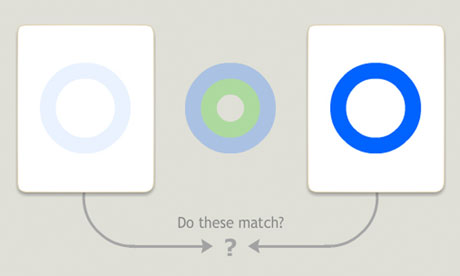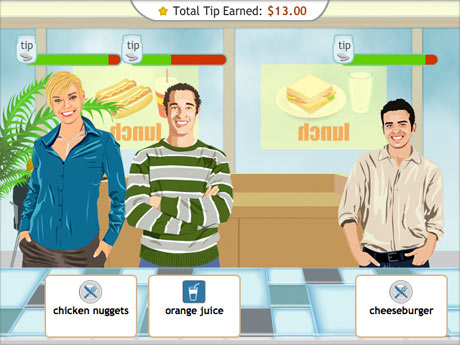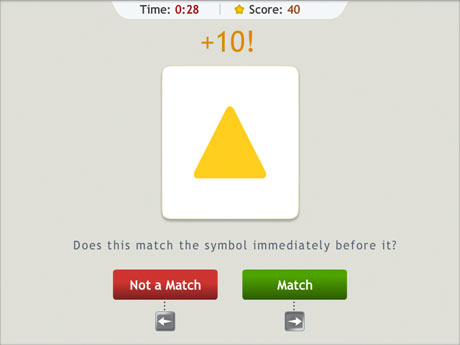
In Memory Match, the task is to remember symbols and compare them to previous ones. Photograph: Lumosity
This is the wonderful world of "brain training". For the past month, I have been completing a series of computer games designed to test my memory, verbal reasoning, concentration and spatial awareness. The beach bar was made out of pixels. The birds were shot down with the click of a mouse. It turns out there are loads of words beginning with TO, many of which I hadn't guessed in the requisite 60-second time.
According to the website for Lumosity, which devised these games and is one of the best-known internet providers of brain training, setting aside a few minutes each day to complete the above tasks can make you feel "smarter, sharper, and brighter". By factoring in a mental workout in the same way that we might go to the gym to exercise, we get cleverer and our IQ rockets.
That, at least, is the idea. And there are lots of people who buy it. In recent years, brain training has become a multimillion-pound business with companies such as Jungle Memory, Nintendo and CogniFit developing a wide range of user-friendly neuroscientific puzzles for the average punter.
Lumosity itself has grown by 150% year-on-year since its launch in 2005 and now reaches more than 35 million people worldwide. In January alone, the company's mobile app was downloaded nearly 50,000 times a day and its revenue hit $24m (£16m). Co-founded by Michael Scanlon after he abandoned his neuroscience PhD at Stanford University, California, the business also has an extensive research programme that studies the effects of computerised cognitive training as well as conducting experiments over the web.
"Lumosity is based on the science of neuroplasticity, the idea that the brain can change and reorganise itself given the right kinds of challenges," says Erica Perng, Lumosity's head of communications. "People have a variety of reasons for wanting to boost their brain power, whether it's to focus at work, do better at school and standardised tests, or just to stay sharp."
In the US, brain-training programmes are used in schools, at a cost of up to $300 per child. Some ambitious parents on this side of the Atlantic have started using the games in place of hiring a private tutor to improve their children's academic scores. And there is anecdotal evidence that keeping a brain lively is helpful in staving off early-onset dementia.
But do such initiatives have any kind of scientific basis? The evidence appears to be contradictory. A 2008 study by the psychologist Susanne Jaeggi found that memory training increased intelligence and implied that a person could boost their IQ by a full point per hour of training. However, when a group of psychologists working at Georgia Tech set out to replicate her findings with tougher controls, there was no evidence for a rise in intelligence.

Familiar Faces: This game is designed to exercise face-name recall. The user plays the role of waiter and has to remember customers' names and orders to earn increased tips and job promotions. Photograph: Lumosity
Owen concluded that regular players of brain games got better at the games themselves through familiarity rather than showing any marked improvement in fluid intelligence (the ability to solve novel problems and adapt to new situations as opposed to accumulating knowledge).
In an attempt to sort out the hype from the reality, I embarked on my own experiment – albeit an experiment with an unimpressive cohort of one and without the controls that would be necessary to get the results peer-reviewed in any respectable scientific publication.
The idea was that I'd measure my intelligence at the start of the month using a variety of tests developed by the Medical Research Council at Cambridge University, designed to give a more sophisticated take on the brain's 100bn neurons than a single IQ test. I would then embark on a rigorous routine of brain training with Lumosity, doing regular exercises designed to make me journalism's answer to Professor Stephen Hawking. At the end of the month, I'd take the intelligence tests again and see if there was any improvement.
"I think it is a fascinating idea," said Dr Adam Hampshire, who developed the MRC tests. "It really gets to the nub of the issue, which is that showing improvements on the exact tasks that are trained is not really sufficient to claim a 'brain-training' effect. This is because such improvements may be specific to the exact tasks that are trained and consequently should not be classified as learning unless a generalised effect is shown. "I am unaware of any convincing evidence to support the view that the commercially available brain-training devices have general benefits in normal healthy adults."
Sitting down to take the initial intelligence test, I am fairly confident. I have a degree and good A-levels. Occasionally, I even get a few questions right on University Challenge. But it turns out to be much harder than expected: a battery of complex, time-pressure tests involving flashing shapes (trying to work out which overlapping triangles are exactly the same size) and long number sequences. One of them, called "Double Trouble" requires me to identify the colour a particular word is written in. Which sounds easy, until you realise that the words in question are "red", written in blue, or "blue", written in red. Even trying to explain the games to someone else taxes my intelligence.

Speedmatch: Lumosity says this game trains you to think faster. The idea is to accurately say whether a symbol matches the one viewed immediately before it. Photograph: Lumosity
I take a couple of days to recover and then I sign up to Lumosity. The Lumosity games are far less intimidating. An effort has been made to make them entertaining rather than hardcore versions of the 11-plus. They are short and sweet and include plenty of encouragement – gold stars leap across the screen when I do something right. Having said that, it's difficult to fit a 20-minute session into my daily life. I don't find the games sufficiently interesting to get out of bed and do them each morning, so my training is rather sporadic – more like once a week than once every 24 hours.
But regular monitoring of my performance by Lumosity shows that I gradually improve in all the games the more I play them. Unsurprising, says David Z Hambrick, associate professor of psychology at Michigan State University. In an interview last year, Hambrick said brain-training games are "designed to tap into this ability to control attention. Their idea is that if we can improve the ability to control attention then we can, by extension, improve people's intelligence... [but] if you find that people get better in one test of reasoning, it doesn't necessarily mean that they're smart; it means they're better on one test of reasoning."
Most research that suggests brain-training works is fraught with difficulties: little has been peer-reviewed or conducted alongside control groups. Several companies use scans of brains "lighting up" to support claims that their programmes are effective, but these simply show a measure of the energy that the brain is using rather than providing any evidence that the brain is being altered in any long-term way. Moreover, it is unclear whether training benefits are only evident for certain sectors of the population – for example children, patients or older people.
"Overall, I would suggest that more research is needed," says Hampshire. "Some people have been motivated by greed to try and cash in early by selling poorly thought-out and insufficiently validated brain-training devices. They have flashy marketing but little data to back up their claims. There is tantalising evidence to suggest that, when properly validated cognitive training regimes are developed, they may have some general benefits."
Last year, Hampshire published research showing that out of 44,600 individuals who took an earlier version of the MRC tests, those who had regularly brain-trained showed no advantage in any form of intelligence relative to those who did not. By contrast, those who regularly played video games did better in short-term memory capacity and reasoning.
"This is an interesting finding because it is really counter to the general zeitgeist that video computer games are bad for us whereas we should all be investing in brain-training devices," he says. "We might just be better off spending our money on a new video games console!"
So how do I fare when I return to measure my intelligence at the end of a month of weekly training with Lumosity? Fairly well, it turns out. I have improved in every single test apart from one ("Monkey Ladder", where I need to remember an ever-increasing sequence of coloured tiles in order), in which I score exactly the same. In "Double Trouble" – the pesky red/blue words – I have soared from 33 points to 51, putting me in the top 6% of the population for reasoning. Overall, I'm now in the top 29% of the population for short-term memory and the top 13% for concentration. My planning skills have stayed more or less static.
Although I'm happy that I'm now supposedly more intelligent than when I started, part of me remains sceptical. I was taking the end tests in a different context: at home, with a mug of strong coffee and no other distractions. And, arguably, it was the second time I was taking the tests, so I was therefore more familiar with them. There's also the fact that I wanted to get better, so perhaps I tried harder, in much the same way that paying for a monthly gym membership is likely to make you feel more motivated to exercise. Still, there's a sense of achievement, nonetheless.
I might not be a genius yet, but I'm really good at identifying when the word red is written in blue ink. That's probably enough to be getting on with for now.
Elizabeth Day, The Observer
Seven Metals, Singing Bowls of Tibet, Benjamin Iobst





















































4 comments:
I've heard so much about these brain games and was skeptical.
I didn't know you use Lumosity, and really don't have a clue, so my comment would be of no consequence, except that if you find that it helpful and enjoyable, who does it hurt?
K. :)
p.s. And I'm going to look into Lumosity for myself. I'll let you know the outcome.
K.
Well, K., I can understand you pov. Actually, I didn't even realizing Lumosity had been around since 2005, nearly a decade until reading that article.
I'm the kind of woman who has always tried anything which I thought would help and be effective for my well being.
From Norman Vincent Peale to Wayne Dyer, etc. So, I think it followed suit to try this.
I can actually see a difference! But it's taken time... :))
Thank you for sharing.
Post a Comment